- Home
- Robert Hellenga
The Sixteen Pleasures Page 16
The Sixteen Pleasures Read online
Page 16
It’s odd, isn’t it, how you can suddenly settle on something, see it perfectly clearly, and then the next minute your imagination runs away with you. I’d been telling myself that death is the most natural thing in the world, but suddenly it didn’t feel natural at all. A person crosses an imaginary line and you can’t see her any more. Is that perfectly natural? Mama crossed that line in the night, alone, and now she’s gone. Forever. And now Sister Agata was about to cross it, too, and I was there, right next to her, on one side of the line, and I thought I ought to be able to catch a glimpse of what lay on the other side. But I couldn’t, and I suddenly thought of Hamlet’s father, dying unhouseled, and of that chilling scene in the Inferno when Saint Francis comes to gather in the soul of Guido da Montefeltro at the moment of death, only to learn that Guido had spoiled everything at the very end by putting his trust in the evil pope—lapsed from a state of grace, nothing to be done about it. My imagination, in spite of my express commands, began to fill the room with angels and devils, waiting just beyond the spectra of human perception, to pounce upon the naked soul of Sister Agata Agape, whose breathing was becoming more rapid and shallow. The fingers were suddenly still. I tried her forehead again. Cool and damp now.
Sister Gemma seemed calmer now. “You should say a prayer,” she said.
“Agata Agape,” I said. Sister Gemma crossed herself. “Agata Agape,” I said again, “go without fear. Go with our love. We will hold you in our hearts. Good-bye.”
And with no more noise than a canoe makes when you shove off from the dock in still water in the night, Agata Agape crossed over an imaginary line and we could see her no more.
“You can call Father Francesco now,” I said to Sister Gemma. “Tell him it’s no false alarm this time. It’s the real thing.”
10
The Sixteen Pleasures
of Pietro Aretino
I stopped by Alessandro Postiglione’s apartment every afternoon to check on the Aretino, which I’d taken apart and washed before interleaving it with absorbent paper and putting it in a gerry-rigged thymol chamber. The apartment was sparsely furnished—Sandro’s wife had taken most of the furniture when she’d moved to Rome a dozen years earlier—but there was a long table that I used for my workbench, and an orange crate to sit on, and there was (at last) running water (not hot, but running).
Sandro, who had given me a key, generally turned up just after I’d arrived or just as I was about to leave, and in either case we’d brew a small pot of espresso and drink it while we talked—about the flood and its aftermath, about the magnitude of the restoration effort, about the incompetence of the government in Rome and the latest political scandal, and about personal matters, too, though Sandro didn’t say much about his wife, except that she’d found Florence too provincial and that annulment proceedings, after spending several years in the lower courts, had finally found their way to the highest court of all, the Sacred Roman Rota. I had nothing comparable to reveal or to conceal, but Sandro seemed to find the details of my childhood in Chicago as exotic as I found the details of his in the Abruzzi. Our favorite topic, however, was neither the great world of public affairs nor the details of our respective childhoods. Our favorite topic was the book itself, the Aretino: How had it escaped the popes wrath in the sixteenth century? How had it found its way into the library of Santa Caterina Nuova? Who had bound it with the prayer book? Had Lucia de’ Medici known of its existence? And above all, How much money would it bring?
The latter question was the only one that was likely to be answered with certainty, but not till Sandro’s friend in Rome—the antiquarian book dealer—had actually sold the book. Like Madre Badessa, he refused to name a figure, but he was eager to see the book, and in fact after it had been in the thymol chamber for two days, there was no reason not to send the loose gatherings to him in the solander box I’d constructed to hold them. But I wanted to be absolutely certain that all the mold spores had been destroyed, and besides, I didn’t trust the Italian postal service. Sandro had to go to Rome in January or February, to put in an appearance at the ecclesiastical court, the Rota, and offered to take the book with him then. By that time, I’d be back in Chicago.
Everyone knows the story of Paolo and Francesca, but let me set it down anyway:
On a day for dalliance we read the rhyme
of Lancelot, how love had mastered him.
We were alone with innocence and dim time.
Pause after pause that high old story drew
our eyes together while we blushed and paled;
but it was one soft passage overthrew
our caution and our hearts. For when we read
how her fond smile was kissed by such a lover,
he who is one with me alive and dead
breathed on my lips the tremor of his kiss.
That book, and he who wrote it, was a
pander.
That day we read no further.
Well, Sandro and I read no further either. Our go-between was not so high-toned, I suppose, as Paolo and Francesca’s French romance, but then ours is not such a high-toned age. But not without its own graces and little courtesies. Sandro led me into the bedroom and undressed me in front of a cheval glass, which is called a psiche in Italian, which is also the word for soul. I had been in love before but I’d never really experienced lust. At least not like this. All the imperfections, with which I was all too familiar, of my stocky, serviceable little body, seemed to disappear in that glass. I was like a statue coming to life, just breaking out of its rigid pose. And my face was suffused with a kind of radiance, not the kind you try to cover up with powder, either.
It was broad daylight and the figures carved on the frame of the mirror stood out clearly: the Judgment of Paris. Aphrodite, Hera, and Athena were all naked as jaybirds.
I reached out and touched them with my finger. The wood was smooth and cool.
“Which one would you have chosen?” I asked.
“Let me see,” he said. His face wore a serious expression, as if he were performing some difficult calculations in his head.
I was down to bra and panties by this time, wondering which he’d remove first. Aware of his face in the mirror, peering first over one shoulder and then over the other. He had removed his jacket and rolled up his sleeves, like a man about to get down to serious business, but he still had his tie on.
“Signorina,” he said, “I would choose you.”
He removed the rest of my clothes and then I, too, was as naked as a jaybird, as naked as I’d been when I stood on the rock overlooking the sea in Sardegna, ready to take the plunge again.
Back at the convent I was sure that everyone would be able to tell what had happened, but nobody seemed to notice and our work proceeded on schedule. The only difference was that my afternoon excursions became more numerous and lengthier. And then one night I didn’t return to the convent till eleven o’clock. This was late for Florence, which is not a late-night town. And it was late for me. It was the first time I’d stayed out, the first time I’d skipped supper. No one had ever said that I had to be in by such and such a time, but I was a little uneasy. I didn’t know if the portinaia would let me in or not. There was nothing to do but ring the bell, which I did.
The door was opened immediately, not by the porteress but by Madre Badessa. Startled, I tried to read her face.
“I’ve been worried,” she said, turning away from me, straightening something on a table that held some pamphlets, information about the convent. The room was a small one, like the little room in a funeral parlor where you sit down to do business with the undertaker. It was lit by a bulb that couldn’t have been putting out more than ten watts. The dampness hadn’t left the walls yet. All the carpeting had been taken out.
“May I speak to you?”
I thought she was going to ask me where I’d been, the way Mama had when I’d c
ome home too late. She’d always been awake, no matter how late it was and no matter how quietly I moved. But it was nice. We’d always have a little talk, and I’d tell her everything that had happened. I never felt I really had to lie to her, though I sometimes spread a thick coat of varnish over the truth.
“Of course.”
“Not here.”
I followed her upstairs to her office.
“Please sit down.” Something formal, distant, odd, between
us.
“You wanted to ask me something?” I thought: She knows what’s happened just by looking at me, or by the way I smell.
Madre Badessa was not perfectly at ease.
“May I ask what your plans are?”
“I’ll have to leave soon.”
“You’re going to Rome?”
“No, to Luxembourg. I’m flying Icelandic. To Reykjavik, then New York, then home.”
“You haven’t thought of staying longer?”
“I’ve thought of it, but I have a job to get back to, I hope, and Papa’s expecting me for Christmas.”
“Because you’re very welcome to stay with us, you know. You can stay as long as you like.”
“Thank you, Madre Badessa. You’re very generous.”
“Maybe selfish rather than generous.”
“You mustn’t think so.”
“You’ve been happy here? Reasonably?”
“Reasonably.” I was uncomfortable. “No, more than ‘reasonably.’”
“And you don’t find our way of life quaint or repulsive?”
“No, how could you say so?”
“Because the world objects to us very strongly. I’ve lived in the world—I used to think that way myself. I thought that the monastic life was a kind of escapism, a running away from responsibilities. But don’t look so alarmed, I’m not going to ask you if you’ve felt a vocation!” She smiled.
I felt more at ease. We were getting close to something.
“When I married,” she said, “I thought I’d never be lonely again. But it wasn’t like that.”
I didn’t know what to reply to this.
“My husband and I were very successful,” she said. “We put together these sewing machines and bought up the local wool, which was usually sent off to Milan . . . He was never unfaithful to me . . .”
A series of false starts. I couldn’t figure out what she was trying to get at. She was like someone trying to join two magnets together, positive to positive or negative to negative. They kept jumping apart. I wasn’t much help.
“We had no children. That was a disappointment. Like Sarah—Abraham’s wife. We tried everything, doctors in Milan and in Switzerland, but nothing worked. I had to accept the fact that I was barren. That changed the direction of my life. What I wanted most was denied to me. You come up against something, a roadblock, you’re so sure of the direction you’re going in, the road you want to take, that it’s inconceivable. But a bridge has been washed out. You have to find some other way.”
The light was dim, the desk bare. There was absolutely nothing on it, not even any scratches.
“And now look. God has given me these children, my daughters, you see. I could never have foreseen it. Daughters in abundance. That’s what I wanted to say to you. People say that God works in mysterious ways when they really mean that life, or something in their own lives, doesn’t make any sense, but I think that’s wrong. I think it means that we can’t make any sense out of life until we give up our deepest hopes, until we stop trying to arrange everything to suit us. But once we do, or are forced to . . . That’s what’s mysterious.”
I wasn’t prepared to agree or disagree. I was too busy wondering how this applied to me. No, I wasn’t really wondering, but I wasn’t prepared to face the issue clearly.
“It’s a joy, but it’s also a terrible responsibility. I am their superiora. I act as their spiritual mother in the place of Christ. Mistakes can be costly.”
“I’m sure you don’t make many mistakes.”
“Oh, child, you don’t know. But what I want to say is that I think of you as my daughter, too. I wish you well, more than I can say. Maybe it’s because you’re different, or in a different situation. You’re bound by no vows, no obligations. But I fear that in your case I’ve made a mistake, and I hope it’s not too late to rectify it.”
“A mistake, Madre Badessa? You’ve been wonderful.”
“You’re very kind, but . . . but the bishop is very unhappy.”
I made a face when she mentioned the bishop.
“The bishop doesn’t make things easy for us,” she went on, “and I’m afraid now that he’ll want to speak to you. I thought I ought to warn you. The bishop can be very unpleasant.”
“Is it about Sister Agata?”
“Yes, but there’s something else, too.”
“The book?”
“Yes, the book. I shouldn’t have asked you to take the responsibility for the book.”
“But it was no problem.”
“It’s not just the book; it’s what I’ve asked you to do or what I can’t ask you to do. I can’t ask you to lie to the bishop for me.”
Deep breath. “Yes, I see. The bishop wants the book.”
“Where is it now?”
I saw now where I stood: between the abbess and the bishop. But I didn’t know what to say.
“Please don’t lie to me, too. It’s not necessary.”
“It’s at your cousin’s, Dottor Postiglione’s. I’m stabilizing it so that it can be sold. He has a friend in Rome who deals with rare books. I won’t have time to rebind it properly myself, so it may take a while. Sandro, your cousin, will bring you the money after it’s been sold.”
“Bless you.” She put her hand on my head and let it slide down side of my face, like a blind person feeling me, trying to figure out what I looked like.
She opened a cupboard and brought out a bottle of vinsanto and some biscotti. She poured two small glasses and we drank.
“Tomorrow morning you will bring it back to me and we can begin again. We can wipe the slate clean.”
“Begin again?”
“God willing. I should never have gotten you involved. It was a mistake.”
“I can’t bring it back tomorrow. I’ve taken it all apart.”
“Then as soon as possible.”
“Yes, Madre Badessa, but what is it you’re worried about?”
“I don’t want to have your lies to the bishop on my conscience, nor do I want to have my cousin on my conscience.”
“I rather like your cousin, but there’s no reason to have him on your conscience.”
“There’s no one I like better. No one more charming, and not in that slick way some Italian men have. He’s unpretentious, open hearted, generous.”
“But you don’t want me to see him? You’re afraid he’ll seduce me? Ruin my reputation?”
Madre Badessa laughed. “Of course he will, if he hasn’t already, but that’s not what worries me. Sins of the flesh have a bad reputation, but they aren’t so very terrible. But he’s a man with no center, no soul.”
“Whatever do you mean by that?”
“I mean that he’s a very agreeable man, but, but, but—”
“But you can’t count on him in a pinch?”
“Something like that. He’s fundamentally unserious. There’s no inner core.”
“Is that so bad?”
“For you, yes. He’ll devour you. He’ll feed on you, use you up.”
“You don’t trust him?”
“Not at all, and you mustn’t either.” She gave me an embrace, a good hug. Smelled sweet, warm, womanly. “And don’t repeat anything I’ve said, please! Now, good night.”
The bishop of Florence, short and red faced, was dressed in a flowing black c
assock, the word for which in Italian is the same as that for petticoat.
Underneath which, I reminded myself, he’s just a man, though Madre Badessa had instructed me to call him Eminenza.
We met in Madre Badessa’s office.
“Let me say that we have been greatly honored by your presence.”
“Thank you, Eminenza.”
“What do you think of the collection?”
“It’s hard for me to say. I’m a conservator, not a collector.”
“But you must have formed some impression.”
“I’d say it’s a very unusual collection. Such a large number of incunabula.”
We talked about the library for a while, and I soon realized that the bishop, despite his red face and roundish figure, his cassock with a thousand buttons down the front and his red biretta, was a powerful man, not a dry stick like Father Francesco.
“But let me speak openly.”
“Please do.”
“You have your vocation, and we have ours. Father Francesco tells me that you took it upon yourself to let Sister Agata Agape die without . . . without the benefit of extreme unction.”
“It’s difficult to know just when someone’s going to die, Eminenza, and Father Francesco made it clear that he didn’t want any false alarms. He was summoned twice, you know.”
“Priests are only human. Unfortunately. But is it true that the novice whose duty it was to sit with Agata Agape wanted to call Father Francesco and that you kept her from doing so?”
“The fact is this, Eminenza: Sister Agata did not want to see Father Francesco again.”
“What Sister Agata Agape may or may not have wanted, or thought she wanted, in her condition, is not the issue. The issue is that you took it upon yourself to interfere with the proper administration of the sacraments. You, a visitor, an outsider. Not even a Roman Catholic. But you take it upon yourself”—a phrase he kept repeating—“to decide who shall receive the sacrament and who shall not. Not even the pope has the authority to refuse the sacrament to the dying.” He paused. “You know that Father Francesco administered the sacraments anyway?”

 Love, Death & Rare Books
Love, Death & Rare Books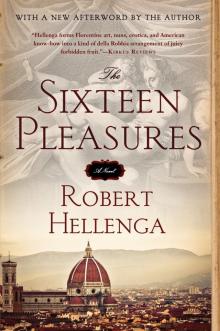 The Sixteen Pleasures
The Sixteen Pleasures The Italian Lover
The Italian Lover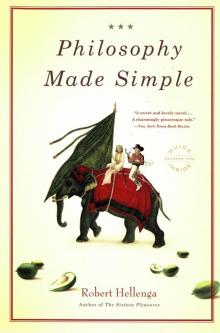 Philosophy Made Simple
Philosophy Made Simple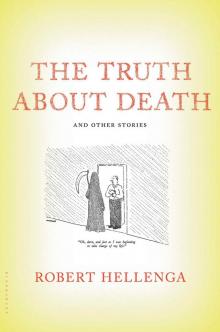 The Truth About Death
The Truth About Death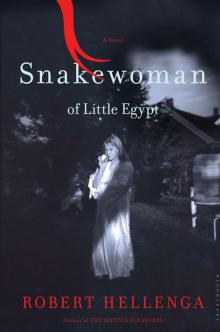 Snakewoman of Little Egypt
Snakewoman of Little Egypt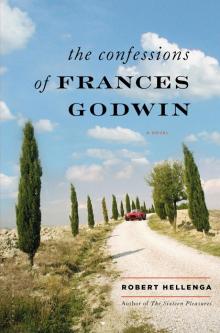 The Confessions of Frances Godwin
The Confessions of Frances Godwin